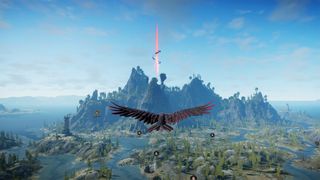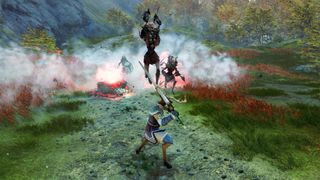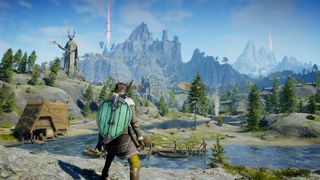I hope Ravenbound actually pulls off its open world roguelite mashup
Systemic Reaction wants to bring more players into the roguelite fold with a pretty, open world.
"Open world roguelite" isn't a set of words I hear together often, possibly for good reason, but Avalanche Studios subsidiary Systemic Reaction is determined to make it work. Systemic shared a hands-off preview with me this week from Gamescom, and creative director Emil Kraftling explained how the heck they're planning to make these two seemingly opposed concepts work together. It's hard to make a judgment call without getting to play it myself, but it sure looks like Systemic is on the right track here. And I'm not just saying that because you can fly around the entire map as a bird.
Ravenbound starts by rolling you three character options at the start of each run, randomly made up of the species (human to start), traits, and weapon types that you've unlocked. At the start of every run you'll leap out the Door of Gales, the first of seven, each leading to different elemental maps, and fly away as a raven.
Ravenbound immediately deviates from the roguelites (and -likes) I'm used to. You aren't crawling through a dungeon room-by-room, or even exploring a non-linear Metroidvania style map as in Hollow Knight. You've got a literal bird's eye view of the forested Gales area with icons pointing out enemy groups, the keys you'll need to collect to progress, and the one town hub per zone.

From up above it would be easy to mistake Ravenbound for an open world RPG, but Kraftling is very explicit that Systemic doesn't want players to expect exploration. It's inspired by Swedish folklore and baddies, but don't see "draugr" and think "Skyrim". As a roguelite, it is still all about combat, just without the linear constraint of a dungeon. The open world is all about offering players immediate choices—how much combat they want, how difficult a challenge they're willing to take on, and in what order.
Raven unbound
In the 17 minutes of gameplay footage Systemic shared with me, lead designer Simon Laserna soars past forests, bridges, and towers, eventually picking out an icon with a single skull denoting the easiest difficulty, also marked as the location of one of three keys he needs to open the boss door in the area.
He dives low to the ground, drops into human form, and uses a sword and shield to swing, guard, and dodge around a group of five humanoid wolf enemies. He can time his shield guard correctly to stun them and power up a high damage sword attack. The sliding dodge allows him to slide in arcs around the fight and he can reposition while jumping in the air too—both of which make combat look a bit loose and skate-y. Kraftling assures me it feels better to play than it appears in the video. I'll have to take his word for it until we get a chance to play ourselves.
After defeating the group, he wins an ability card draw from his deck which grows across runs as a form of meta progression. I'm a bit worn out on deckbuilding getting strapped to the hood of every genre, but not enough to hold it against an otherwise cool concept. Cards require mana to be used, which comes from leveling up, which comes from combat. There's a level gain cap in each of the zones, meaning that endless grinding is more likely to deprive you of your limited health potions than reward a card draw you wanted—be it more armor, a damage buff, or some other effect.
The biggest gaming news, reviews and hardware deals
Keep up to date with the most important stories and the best deals, as picked by the PC Gamer team.

Those initial enemies were basic stuff, but Laserna eventually takes on a group of three Vittras, flying wraith-like women who are quick with high damage daggers but easy to stagger by mastering the perfect guard. After that, he jumps off one of the raven pillars nearby to transform and fly over to the town where he buys a new health potion before taking on, and dying to, the area boss: a tall and fast knight lad with a sword and shield.
Although I don't get to see the next run, Kraftling explains that the landscape of the world will be the same but the placement of enemies, keys, and structures will change. "In one lifetime it could be a working mining camp and in another it could be an abandoned, haunted-by-draugr mining camp. Certain pathways or caves could be open or not open in different runs." Kraftling lets on briefly that Systemic also plans to deliver live service updates to the game, which may include new types of structures on the map.
Kraftling reckons getting through a single area takes about 20 minutes, and around an hour for a full run through the subsequent doors to the final boss. After you've spent around 10 hours dying, retrying, and unlocking new cards as one does in a roguelite, that is.
A lite touch

"The roguelite and open world combination is not really done," Kraftling says of the mashup. "We felt that maybe more people would enjoy roguelites than actually do now and maybe we can bring something to the table to bring people into the light."
"Open world is what we've done so many times over 20 years through both Avalanche and Systemic Reaction. That's where we start. Then we look at what kind of games we like to play, and what kind of games [other] people like to play, and where there's overlap of something that we can feel passionate about and find a strong community."
Kraftling admits that yes, the two genres did clash with each other initially during development. It feels a bit like Systemic has put itself into that riddle about getting a fox, goose, and bag of grain across a river without any of them eating one another, imposing things like the area level cap to keep the open world bits from gobbling up the pressure of a roguelite. And yet, maybe they've solved it. Maybe the farmer gets all three to the other side.
I won't deny that 3rd-person action fantasy combat inspires some leeway in my mind. I rarely get on with roguelikes or lites. I'm not great with top-down combat or bullet-hells and most seem to wind up with one or both. A roguelite where I get to pick my battles though, with combat closer to something like The Witcher or modern Assassin's Creed games—maybe that's something I wouldn't mind dying in over and over again.
Also, being a raven looks cool.
Systemic Reaction hasn't given an expected launch window yet, but it is planning to run a closed beta "soon," which you can sign up for on its website or just wishlist it on Steam.

Lauren has been writing for PC Gamer since she went hunting for the cryptid Dark Souls fashion police in 2017. She accepted her role as Associate Editor in 2021, now serving as self-appointed chief cozy games and farmlife sim enjoyer. Her career originally began in game development and she remains fascinated by how games tick in the modding and speedrunning scenes. She likes long fantasy books, longer RPGs, can't stop playing co-op survival crafting games, and has spent a number of hours she refuses to count building houses in The Sims games for over 20 years.

Amazon's Mass Effect TV show now in 'active development' from the writer of F9: The Fast Saga (the one where a car goes to space)

Take-Two CEO says Grand Theft Auto 6 is on track for 'fall' next year, GTA 5 has sold over 205 million, and 'PC will be more and more a part of [our] business going forward'
Most Popular

